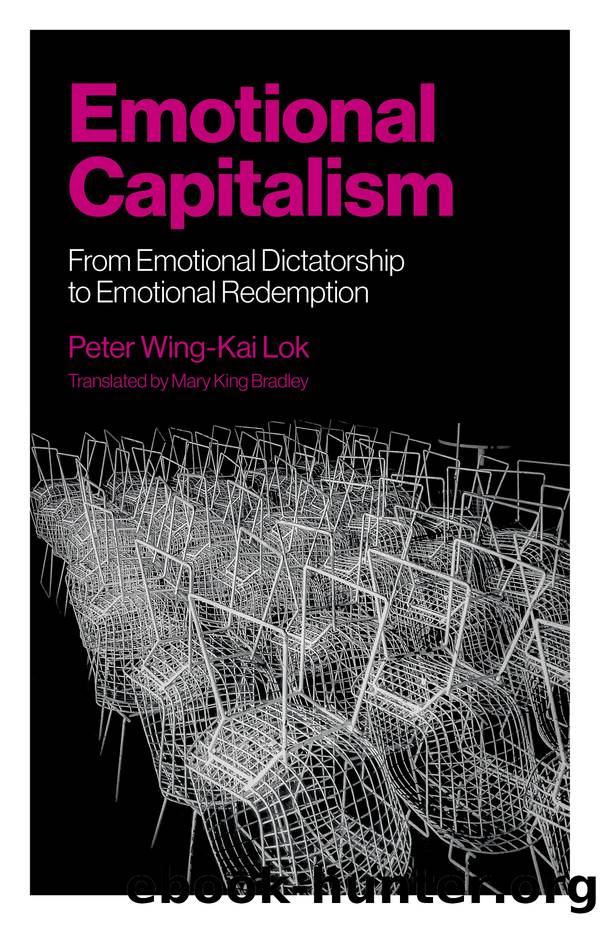Emotional Capitalism by Peter Wing-Kai Lok;

Author:Peter Wing-Kai Lok;
Language: eng
Format: epub
ISBN: 9781803414515
Publisher: National Book Network
Published: 2024-03-15T00:00:00+00:00
Chapter 3
From the Affective Subject to the Ethical Subject: Emmanuel Levinas on the Inseparability of Suffering from the Ethics of the Other
The more I return to myself, the more I divest myself, under the traumatic effect of persecution, of my freedom as a constituted, willful, imperialist subject, the more I discover myself to be responsible; the more just I am, the more guilty I am. I am âin myselfâ through the others.
âEmmanuel Levinas
Whether we are discussing the burnout-subject of Byung-Chul Han or the disaffected subject of Bernard Stiegler, the individual is emotionally numb and indifferent to the exterior world. This disaffected subject has neither the motivation to communicate with and help others nor any interest in establishing an intersupportive sense of community (Stieglerâs ethical sense of we). In fact, the predicament we face today is an ever-greater ignorance of and disdain for the living conditions of the other. From Syrian refugees to the Rohingya in Myanmar, from unskilled labourers in Mainland China to Hong Kongâs poor, all these examples of the other have had their right to life exploited. The Italian political philosopher Roberto Esposito believes that to protect their members from invasion by outsiders, todayâs communities are increasingly seeing themselves as groups with immunity;119 The other, who belongs to a group foreign to the community, is accordingly eliminated like a germ and subjected to violent treatment (such as when refugees are dragged out of the high seas). In addition to this, we are seeing present-day capitalism in combination with the state carry out a daily increase in the manipulation, surveillance, and segregation of the public. Add to this the serious problem of human exploitation that occurs in emotional labour, and we are inevitably even more on guard against the suffering and oppressed other. For this reason, contemporary Western theorists are rethinking various biopower systems and how violence plays an implicit or explicit role in our treatment of the life of the other. Giorgio Agamben, for example, critiques national forms of government that use a state of exception120 to strip a person of all rights, creating one bare life after another. Zygmunt Bauman describes liquid modernity and reflects on the wasted lives that cannot keep up with its high rate of productivity and consumption; he also demonstrates that contemporary theorists are right to ask how the state incorporates capitalism and constructs/plans/manages our subjectivity and the extent to which we value life.
As we face our current predicament, we should not be concerned solely with how those in power dominate and oppress the other. We should also take an interest in how we can transform the individuals of a civil society from indifferent subjects into affective subjects who care about others; in how a disaffected subject can regain the power to rebel and even how to nurture subjects who become the other in order to protest. I donât deny the need to change the system. The system must be changed to change the lives of the vulnerable. But this cannot be done all at once.
Download
This site does not store any files on its server. We only index and link to content provided by other sites. Please contact the content providers to delete copyright contents if any and email us, we'll remove relevant links or contents immediately.
The remains of the day by Kazuo Ishiguro(7584)
Tools of Titans by Timothy Ferriss(6980)
The Black Swan by Nassim Nicholas Taleb(6214)
Inner Engineering: A Yogi's Guide to Joy by Sadhguru(5920)
Giovanni's Room by James Baldwin(5901)
The Way of Zen by Alan W. Watts(5814)
The Six Wives Of Henry VIII (WOMEN IN HISTORY) by Fraser Antonia(4802)
The Power of Now: A Guide to Spiritual Enlightenment by Eckhart Tolle(4780)
Astrophysics for People in a Hurry by Neil DeGrasse Tyson(4634)
Asking the Right Questions: A Guide to Critical Thinking by M. Neil Browne & Stuart M. Keeley(4609)
12 Rules for Life by Jordan B. Peterson(3760)
The Ethical Slut by Janet W. Hardy(3520)
Skin in the Game by Nassim Nicholas Taleb(3489)
Housekeeping by Marilynne Robinson(3427)
The Art of Happiness by The Dalai Lama(3396)
Double Down (Diary of a Wimpy Kid Book 11) by Jeff Kinney(3292)
Skin in the Game: Hidden Asymmetries in Daily Life by Nassim Nicholas Taleb(3280)
Walking by Henry David Thoreau(3242)
12 Rules for Life: An Antidote to Chaos by Jordan B. Peterson(3211)
